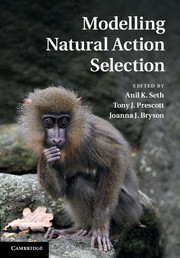Book contents
- Frontmatter
- Contents
- Foreword
- Preface
- Contributors
- 1 General introduction
- Part I Rational and optimal decision making
- Part II Computational neuroscience models
- Part III Action selection in social contexts
- 18 Introduction to Part III: action selection in social contexts
- 19 Agent-based models as scientific methodology: a case study analysing the DomWorld theory of primate social structure and female dominance
- 20 An agent-based model of group decision making in baboons
- 21 Endogenous birth and death of political parties in dynamic party competition
- 22 On optimal decision making in brains and social insect colonies
- 23 State-dependent foraging rules for social animals in selfish herds
- Index
- Plate section
- References
18 - Introduction to Part III: action selection in social contexts
from Part III - Action selection in social contexts
Published online by Cambridge University Press: 05 November 2011
- Frontmatter
- Contents
- Foreword
- Preface
- Contributors
- 1 General introduction
- Part I Rational and optimal decision making
- Part II Computational neuroscience models
- Part III Action selection in social contexts
- 18 Introduction to Part III: action selection in social contexts
- 19 Agent-based models as scientific methodology: a case study analysing the DomWorld theory of primate social structure and female dominance
- 20 An agent-based model of group decision making in baboons
- 21 Endogenous birth and death of political parties in dynamic party competition
- 22 On optimal decision making in brains and social insect colonies
- 23 State-dependent foraging rules for social animals in selfish herds
- Index
- Plate section
- References
Summary
In nature, action selection is rarely purely an individual matter; rather, adaptive action selection usually involves a social context. As Seth demonstrates in Part I, the apparently irrational behaviour of an individual viewed in isolation can, in fact, be optimal when considered in a semi-social context that includes competing conspecifics. Importantly, the agents in Seth's model express no explicitly social behaviour – there are no direct costs or benefits associated with social interactions. Rather, agents in the model interact indirectly via their effects on resource distribution in the environment. This demonstrates the ubiquity of social phenomena in nature, which of course will, in general, lead to selective pressure for social adaptations.
The final section of our volume is dedicated to studies of action selection in an explicitly social context. All of the models here do include social actions for individuals to select among. Once we begin to consider societies, however, it also becomes apparent that we can study action selection at the level of the society itself, and how such selection emerges from individual behaviour. In this introduction, we discuss the evolutionary and theoretical background underlying social action selection whilst briefly highlighting some of the contributions of subsequent chapters regarding current controversies in this field.
- Type
- Chapter
- Information
- Modelling Natural Action Selection , pp. 421 - 426Publisher: Cambridge University PressPrint publication year: 2011



